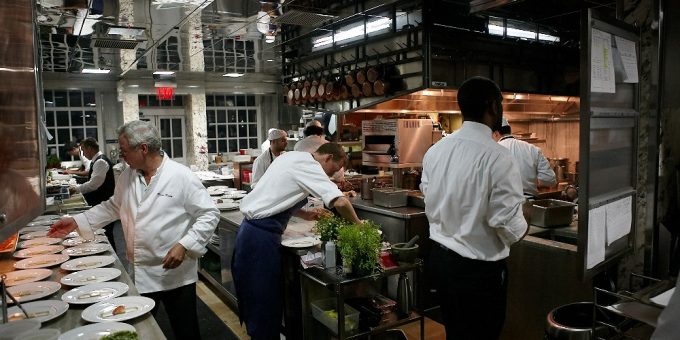
Inside the kitchen at Bouley's flagship restaurant. Chef Bouley is pictured at left. Zagat Buzz, Flickr CC https://flic.kr/p/73vk7z
The Class Politics of Fine Dining
Some people still have stress dreams about high school exams. I still have stress dreams about working for David Bouley.
Famed chef David Bouley passed away in February 2024. His New York Times obituary notes that his masterful cooking transformed fine dining. As a former employee of Bouley’s, I know the class politics of fine dining says as much about Bouley’s legacy as his highly lauded cuisine. I spent a couple of formative years working at Bouley, the Chef’s namesake lower Manhattan flagship. Working for a legendarily dictatorial boss in a legendarily dictatorial business premised on inequality was an education for a budding sociologist.
I worked my way up the hierarchy at Bouley’s from a food-runner to a captain while studying at the Borough of Manhattan Community College. My first sociology professor, Jack Estes, encouraged me to do an ethnography of the restaurant. Although I (regrettably) did not follow his advice, my sociological imagination was shaped by this (mostly) terrible on-the-job education where I (mostly) learned how not to treat people. I also learned that luxury, however pleasurable, is often just cleverly concealed exploitation.
The aura of transcendent individual genius around Bouley, and celebrity chefs generally, obscured the collective labor facilitating genius. As a headwaiter, my goal was to create the illusion that nothing unpleasant could spoil the meal, while knowing the entire ritual was marinated in cruelty. Wage theft was so common that on payday, we would rush down the block to HSBC to cash our checks before they bounced. Bouley was also known to stiff suppliers.One of the most egregious examples of Bouley’s worker exploitation took place in the wake of 9/11. Bouley’s Tribeca restaurant was just a few blocks north of the World Trade Center and, like much of the city, closed following the 9/11 attacks. For months after, Bouley used his kitchen to feed rescue workers through a contract with the Red Cross. This ostensibly selfless gesture became selfish when “what started as a charitable effort became a business venture.” Bouley was profiting from every meal served to relief workers, despite the fact that he was relying on the labor of volunteer staff and donated food. Ignorant of this profiteering, I was hired as part of the team that reopened the restaurant the following February. On the one-year anniversary of the attacks, we served first responders a special five-dollar tasting menu. Bouley told us to serve the first responders cooking wine, as he was confident that they wouldn’t know the difference. I don’t know if Bouley ever read Bourdieu, but he definitely understood how to manipulate symbolic distinctions to assert superiority.
Consumption was conspicuous. A party of two could, with the right bottle of wine, easily spend three thousand dollars on dinner. Watching people order expensive wine and barely consume it, while the server’s family back home earned less than the cost of a single bottle, was radicalizing. One shift, a party of seventeen buzzed Wall-Street guys (there were a lot of buzzed Wall Street guys) got into a pissing match over their wine knowledge. They collectively expressed disdain for the wine selection chosen for the meal, a corporate meeting. Refusing to drink below his station, one guest pulled me aside and ordered a more expensive bottle. It then became a game of drunken one-upmanship, with increasingly expensive bottles ordered for each subsequent course. Dessert was paired with bottles of Château d’Yquem (at the time, a dessert wine marked up to $1,200). When I presented the bill, the host asked why I had included a $2,700 gratuity. After I explained this was house policy for parties larger than six, he shrugged, said “Good job,” and added another $2,000.Bouley remains one of the most racially and ethnically diverse places I’ve ever worked. But the “abstract worker,” per Joan Acker’s formulation, was definitely male. There was only one woman head waiter employed in the roughly two and a half years I worked there, and the kitchen was also predominately male. Exclusionary sexism encouraged a kind of locker-room masculinity, where interactions were characterized by hierarchy and hostility. This masculinity, coupled with windfall tips and the general air of ruthlessness they encouraged, was stressful, and physical conflicts could erupt unexpectedly. I once witnessed an exasperated food runner, tired of being harangued, throw palate-cleansing bowls of elderflower sorbet all over the maître’ d’s suit before fleeing the kitchen. He never returned. On another occasion, I walked into the kitchen as a fleet of line cooks ran from their stoves to stop a waiter wielding a glass liter of Evian from squaring off with a cook hoisting a pan of boiling oil. Violence is normalized in the restaurant industry, so, once they were separated, we just continued serving food.
At Bouley, the customer was not always right: the Chef believed he was. In many restaurants, complaints about the quality of diver sea scallops might garner a discount. At Bouley, such complaints could lead to a message from the chef that your meal was over, and that you and your party might prefer to dine elsewhere. Requesting well-done meat or sauce on the side might be interpreted as a personal affront. Your request might be denied, and you might face a degradation ceremony. If your picky eight-year-old didn’t like the celery sauce accompanying the rare Kobe beef (at the time, about $115 for 10 oz), too bad. You should have hired a sitter.

Zagat Buzz, Flickr CC, https://flic.kr/p/73zjW5.
Eating at elite fine dining restaurants like Bouley often means subsuming one’s personal preferences to the chef’s superior taste. Understanding this was a marker of class distinction as sharp as having the money for dinner in the first place. The maître’ d repeated a story, perhaps apocryphal, of a woman having the temerity to question the Chef’s taste. Pleased with a beautiful King Salmon that had arrived in the kitchen after being flown from Alaska that morning, the Chef had it paraded through the dining room before it landed on the menu. Despite this display of freshness, a guest complained that her fish tasted fishy, which, in a normal restaurant would have been mundane. Bouley responded to this affront by telling the maître’ d to kindly inform the couple that their meal was on the house and he hoped they enjoyed it; and also that the meal had reached its conclusion, and the couple should leave. Still hoping to try the hot Valrhona chocolate soufflé, the couple demurred. The soufflé never arrived. Bouley sent busboys to remove, in succession, the couple’s plates and place settings, then the table’s fresh flowers, then the table lamp, the tablecloth, and finally the table itself. When the busboys finished, the couple sat, separated by only their humiliation. I wasn’t working during this alleged degradation ritual, but the maître’ d’s repeated (and approving) recounting of this story conveys a sense of the restaurant’s self-image. As the arbiter of taste, Bouley was ostensibly there to serve, but actually there to teach his customers.
Working for Bouley was compelling, although I often hated what it was in service of. It was also a good lesson in how people can become complicit in, and even derive a certain perverse enjoyment from, structures that objectively oppress them. Employees had an ethos I describe as a psychotic perfectionism (as an academic, some may question how far I’ve moved from this particular trait). We knew we were working at one of the best restaurants in New York City (and the world). We craved the glory—and the compensation—associated with that greatness. We fussed over the distance between the bottom of forks and the table’s edge and used razor blades to cut threads off tablecloths before service. Meals unfolded with a specific opulence and rhythm—and when the timing was right, our service contributed to the performance. I had worked in the service industry for years before I was hired, but witnessed this devotion to perfection, however pathological, only at Bouley.
As employees, we recognized that this psychotic perfectionism hurt us. Its enactment depended on a set of asymmetrical exchanges that placed us firmly, and perpetually, in lower status. Of course, I interacted with some great customers. There was something beautiful about serving the occasional teacher whose family had decided to splurge on their birthday, or the couple blowing their budget on a once-in-a-lifetime anniversary dinner. But the most entitled diners were accustomed to transmuting their whims to reality with money. Serving them, it often felt as if waitstaff may as well have been furniture, only visible or worthy of notice when a lump or fray spoiled their comfort.
One day, Jack Estes, the professor who had suggested I write an ethnography about the restaurant, told me I looked terrible. When he asked what was wrong, I told him about the working conditions and the gross inequality at Bouley. He said, “It sounds like this job is everything you are against.”He was right, so I quit.
If you’ve made it this far, it’s clear I can’t unequivocally co-sign Bouley’s posthumous lionizing. Nonetheless, I’m thankful for the ways working at Bouley shaped my sociological analysis. Sociology’s core concepts—social boundaries, differential power—feel less like bloodless abstractions when failing to navigate these abstractions correctly means you won’t make rent. And selling the pleasures of exclusion showed me that sociology’s normative assumptions—that inequality is bad, and that we should do something about it—is, for some, less compelling than an overpriced Pinot Noir and slice of rare duck.
Victor Ray is in the Departments of Sociology and Criminology and African American Studies at the University of Iowa. He is the author of On Critical Race Theory: What it is & Why it Matters.

Comments 5
Louis Phillips
March 31, 2024Very good essay. I see that my good friend Jack Esetes was an importtant influence]
upon your life.
Kelly Jones
March 31, 2024Thank you for writing this. It resonates with me deeply. In many ways, my work in San Francisco fine dining was more of an education than community college. I got more than a deep understanding of class divides. As someone who barely graduated from high school, the formal learning apparatus required of fine dining workers mirrors that of formal education. Obviously, I attribute my chance to earn my PhD to the money I made in the industry. But it was more than that. Fine dining requires of FOH staff upright posture, standard English, and most importantly, learning specialized knowledge I was to convey to audiences conversant (or maybe not) in particular subject matter. That said, the industry shouldn’t exist, and my nightmares mostly feature Daniel Patterson. Thanks again for the piece.
NLK
April 1, 2024Hi, I actually came from Twitter/X, but I just want to tell you that this was beautifully written.
"It was also a good lesson in how people can become complicit in, and even derive a certain perverse enjoyment from, structures that objectively oppress them."
That hits quite deep, especially in the politics of my country.
Thank you for writing this.
bob
April 3, 2024My instinct is that approximations of perfection are most often achieved through tyranny, suffering, and punishment. Why? Because doing exceptional things is exceptionally hard - they require exceptional discipline, and exceptional discipline is created through those mechanisms; it isn't created by tolerance and empathy, because they are mechanisms that tolerate and allow for errors.
SpaceX, Michelin-starred kitchens, elite units in the armed forces, Formula 1 teams are examples of the phenomenon. There's a reason that they all resemble each other in their cultures: because it's convergent or independent evolution of a solution to hard tasks.
Kamakshi
April 3, 2024How different it was to eat at the Hungarian restaurant owner in Sue Grafton's novels.